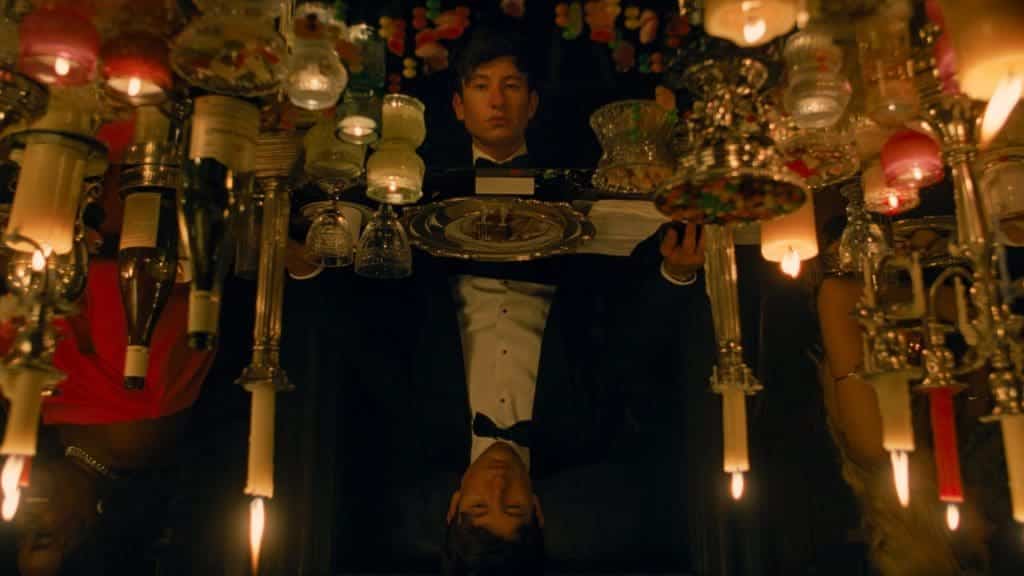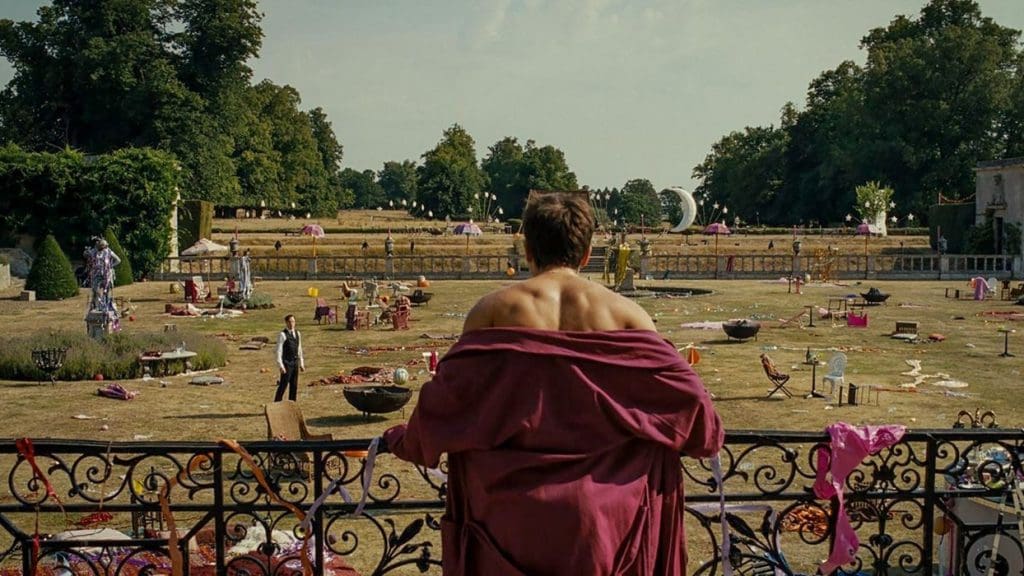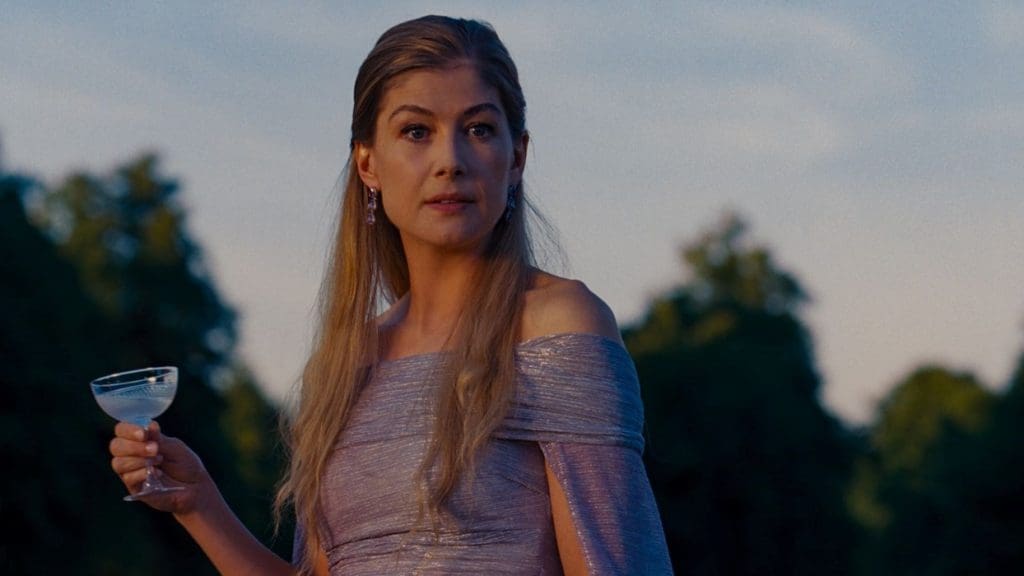
Emerald Fennell is sitting in a corner of the Dorchester Hotel’s Chang bar. It is dimly lit red-velvet Bright Young Things; and I suspect this is where many secrets were once shared before they made their way into London high-society (you know, in the good old days.) She greets me in a rouge-coloured dress and matching lipstick, sporting a new blunt blonde bob. It is modelled after Natasja Kinski’s character in Wim Wenders’ Paris, Texas she tells me and that she took her hairdresser a still from the film as inspiration. Now that she mentions it, Emerald looks a lot like Kinski. At least, she does while sitting here at the glamorous Chang Bar.
Why are we here, then? Emerald’s second film Saltburn has just been screened at London Film Festival, and to rapturous praise. It tells the story of a young and clever Scouse upstart who, when joining the Oxford University, befriends a handsome and charming member of the British aristocracy, and falls crazily in love with his world…with murderous consequences. If it sounds a bit Talented Mr—rah-rah—Ripley then yes (and those comparisons have already been made) but Saltburn is its own monster: more twisted, more stylish, and is gorgeously directed; from the libraries and pubs of Oxford to the large houses with their Caligulan parties filled with excessive drinking, sex, and vomit. Oh—and there are scenes where Jacob Elordi and Barry Keoghan frolic naked in large country fields (you might have heard about those.) Here, Emerald Fennell discusses Saltburn, which is the latest entry in a long tradition of great British genre stories set in large houses, with beautiful people, and the looming shadow of traumatising desire.

A Rabbit’s Foot: There’s plenty of small moments of nuance in the film that convinced me to rewatch it again. Do you think a second viewing benefits the audience?
Emerald Fennell: I hope it won’t be ‘better’, because I think there’s something kind of visceral and thrilling about the first time. But definitely, like you make something—at least the people I work with—where there isn’t a single corner of a frame that doesn’t have something important in it. Everything is a decision, no matter how small. If I place an ashtray in the frame, I think about how it got there. It might’ve been stolen by the family from Tramps [the private members club in London], perhaps, where the parents would’ve hung out in the eighties. Or perhaps some novelty gift from Felix in his gap year. The small things always add up to the character. It’s hard to have an argument when you leave the cinema when things are too plain. It’s always a difficult dance.
ARF: As someone who went to Oxford, are the characters we see on screen people that you have encountered and brought to life—I’m thinking of a manipulative Ollie or a friendly Felix?
EF: I mean, they come from so many different things. But the main place they come from is myself, unfortunately. I probably think in many ways, the more embarrassing or pathetic a character is, the likelier they are closer to me [laughs]. You know, the tragic details. Things that are deeply uncool tend to be the things that have worked for me. Felix was made to be the kind of 2006 dream boy that none of us could exist, but who is deeply ill-advised now.
ARF: I think you subverted expectations by making Felix and his family, generally, good people.
EF: Well Felix is an affable buffoon. But generally, of course: I needed to make the world seductive for the viewer. You can’t make a movie like this unless the audience becomes complicit in fetishing the house, the beauty of the people, and their clothes in the way Ollie does. And the disarming thing about Felix or Elspeth is that the one thing they’ve been bred to do is to be extremely charming. Also, I don’t understand the concept of demonising these people. It’s not interesting. What I find the most fascinating in this, as well as in Promising Young Woman, is that the people you like can let you down in chilling ways.
ARF: The film is set in 2006. Would it have also worked today?
EF: You absolutely could set it now, too. That’s the thing about this world—it’s still the same as it was in Brideshead Revisited [by Evelyn Waugh] or The Go-Between [directed by Joseph Losey]. It’s unchanging—the house, the bones, the people you see are unchanged. Partly it’s because of the kind of structure of this genre, you would have a narrator going back over a time that changed their life, as Ollie does in Saltburn. So it’s in that Gothic tradition. But then I also realised when I was writing it that nothing is more excruciatingly uncool than 15 years ago, which is humanising.
But if you set it today, with today’s teenagers, it’s just going to look like a beautiful fashion commercial. Or you could set it in the nineties, or before, and it’s more of a period piece where the time takes on an importance. 2006 felt close enough to feel outside of a time period. It can’t be defined yet.
ARF: In Promising Young Woman, there were a number of different endings. I was wondering if you had the same dilemma with Saltburn?
EF: To be fair [to] Promising Young Woman, it always had the same ending. There was just an appendage added. The original ending was deemed too bleak, and normally, I wouldn’t care about being too bleak. But the point was made to me [by the studio]. There comes a point where something can be so enraging to an audience that people won’t want to watch it. But with this film, the end was always the end. The difficulty was that my instinct has always been to reveal a lot less. But I think that audiences wanted to know definitely what had happened—there was just the question of how much we showed them. But the ending was already understood from the start, because in this genre, what usually happens is that lives are ruined, and the characters are never over it. They remain unfulfilled, like Ollie does by the ending of Saltburn. The question I wanted to pose was: How do you get what you want out of something that will never want you back?

ARF: But do you think Ollie wins the game at the end?
EF: Absolutely. He’s won. But what has he won? What he really wanted was to be admitted and part of that world. It’s a pyrrhic victory. So yes, he’s there…but that world’s never going to be his. He’s got the family’s stones with their names on them, and it’s something he looks at every morning, and it’s a triumph but it’s loneliness. He wants to be special. And you can’t be special on your own. That’s why Saltburn is fun to watch again. The road to the ending is suddenly all in plain sight. And the first line of the film is a lie, by the way: “I wasn’t in love with him.” Like, it’s literally pictures of Felix writhing around sweating.
ARF: Why tell this story, with these themes, after Promising Young Woman?
EF: I think the themes of the film—I hate talking about themes—is that we are all in a permanent state of wanting and desire, and of watching other people. The internet has given us access to things we didn’t know we wanted. For me, it’s interior design and properties; like the amount of property porn, food porn, people, clothes…stuff there is out there. We are in a state of wanting, and our relationship with this ‘stuff’ makes us feel kind of ashamed. And that shame makes us hate the things that we want. And so I think in some ways, the first thing I thought about when devising this film was of someone looking at the bottom of a bathtub. We’re all gobbling up other people’s old bathwater. And it makes us mad.
ARF: Talking of bathwater, can I ask about some of the gross-out scenes in the film? The audience was recoiling during certain segments.
EF: Well, I think that says more about you. We’re not used to seeing how actual desire looks. Slurping the bottom of a bathtub when you’re absolutely fucking deranged with desire for somebody you cannot have is specific and visceral, but it’s no weirder than what we do at our most physical and driven and alone, when nobody’s watching. I think if you interrogate your desire, it can be really peculiar. With all of the sexual scenes—including when Oliver seduces Venetia—it’s facetious to say they’re not intense. But perhaps when the audience is squeamish, it’s because there may be something we recognise in ourselves—they’re human and honest. I made these characters, and I wrote them, because I think they’re incredibly sexy. But sex can be embarrasing. That’s why I think back to Nicolas Roeg, and that work from the seventies and eighties, because sex in these films felt less posed. It was messier.

ARF: Obviously, people have discussed some of the film’s influences—like Brideshead Revisited and Donna Tartt.
EF: Of course. I think when you’re making a sort of pastiche of a specific genre—and this absolutely is that—the thing I never want to do is pretend between myself and the audience that we’re not watching a film. There’s a suspension of disbelief that acknowledges: this is a film, we made this for your pleasure. Hopefully there are things in it that will relate in some way. But I’m not trying to make something tethered entirely to real life. But not to say it isn’t truthful…So it’s weird to make a film that deals in genre, but doesn’t acknowledge the other works in that tradition. It’s the stuff I’ve always loved…I was speaking the other day about TS Eliot, who made his work out of other things around him. But his writing is still unique. With genre, you need it to feel specific, and a new experience…which I hope that this is. But it would be ludicrous to make a film about something happening in a country house one summer, and not acknowledge the precedents. It would seem bogus.
Saltburn is in cinemas now.





